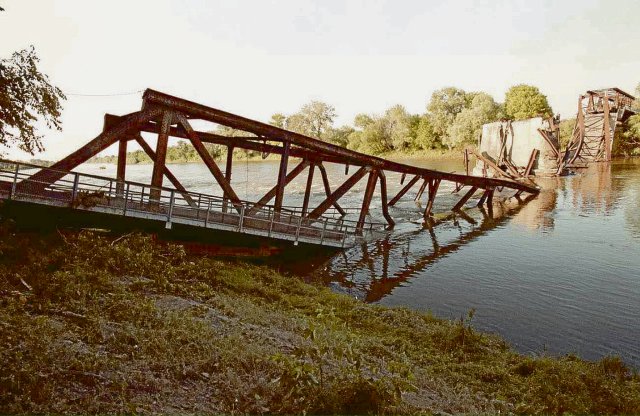The bridge near Varvarin, selected as a target by Bundeswehr reconnaissance flights
Photo: dpa/Sasa Stankovic
The first war of aggression in Europe after the Second World War was waged by NATO. On March 24, 1999, Western military alliance forces began bombing Yugoslavia without a UN mandate. It was also the first war deployment by the German Bundeswehr since 1945. The bloody ethnic conflicts that broke out during the separation of the various federal states and regions of the former federal republic of Yugoslavia served as the pretext. With the active participation of the Federal Republic of Germany, the secession of Slovenia and Croatia, and later Bosnia-Herzegovina and other republics, took place. The Serbian province of Kosovo became a particular conflict area, where Western states supported the Albanian KLA, which, among other things, carried out terrorist attacks on Serbian police stations.
In the summer of 1998, Kosovo was torn apart by a merciless civil war and the OSCE sought a ceasefire. The USA pushed for military intervention, while the Europeans once again invited negotiations to Paris in February 1999 between representatives of the Yugoslav central government and the Albanian KLA. But instead of talks, the Albanian negotiator Hashim Thaci, later “President of the Republic of Kosovo”, blocked any agreement. US diplomat Richard Holbrooke then made an ultimatum call on Yugoslav President Slobodan Milošević to agree to Kosovo’s independence. When he refused, NATO began massive air strikes. In order to justify the war against its own population, the German federal government claimed that a “Serbian expulsion plan” had to be stopped. Foreign Minister Joschka Fischer (Greens) even announced that they wanted to prevent “a new Auschwitz.” Veterans of the anti-fascist struggle and those persecuted by the Nazi regime protested.
The war against Yugoslavia lasted 75 days. Apparently “only military targets” were to be hit. The ruins of the state television station in the middle of Belgrade, which can still be seen today, show that the destruction of the state infrastructure was entirely intentional. NATO spokeswoman Jamie Shea announced that “collateral damage” was also the responsibility of President Milošević because he had resisted NATO’s urging. In mid-April, 73 people died in western Kosovo when NATO planes bombed a refugee train. The air raid on the bridge near Varvarin on May 30, 1999 will probably still be remembered in this country. Years later, relatives of the victims demanded compensation from the Federal Republic, which was rejected by the German courts.
NATO’s military superiority was unable to bring Yugoslavia to its knees militarily for over two months. The Yugoslavian air defense even managed to shoot down a “stealth bomber,” NATO’s most modern piece of military equipment at the time. British Prime Minister Tony Blair was now considering deploying ground troops. But at the beginning of June 1999, Belgrade decided to give in to NATO blackmail in order to protect its own population. NATO units invaded Kosovo.
The cruel outcome of the war: around 15,000 victims of the NATO bombing. The ethnic conflicts have not yet been resolved to this day. The status of the province of Kosovo under international law is neither internationally recognized nor are the rights of the Serbian population secured. What remains is that the right to self-determination of people in a region cannot be enforced by military force, but only through negotiations and treaties under the responsibility of the United Nations.
The historian Dr. Ulrich Schneider is federal spokesman for the VVN-BdA and Secretary General of the International Federation of Resistance Fighters against the Nazi Regime (FIR).
#ndstays – Get active and order a promotional package

Regardless of whether it is pubs, cafés, festivals or other meeting places – we want to become more visible and reach everyone who values independent journalism with an attitude. We have put together a campaign package with stickers, flyers, posters and buttons that you can use to get active and support your newspaper.
To the promotional package
judi bola link sbobet link sbobet sbobet
